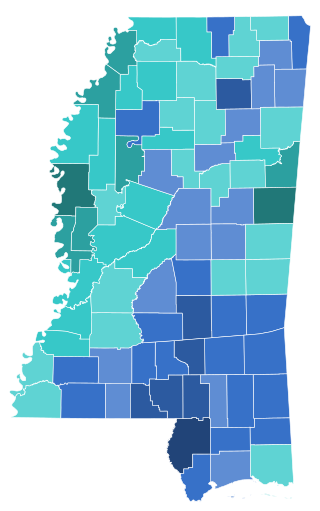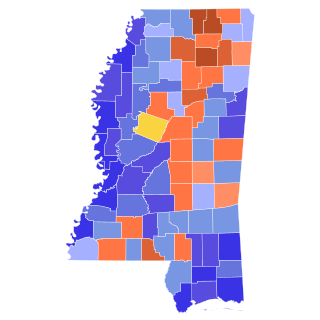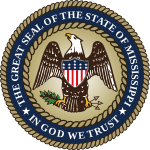
Byron Patton "Pat" Harrison was a Mississippi politician who served as a Democrat in the United States House of Representatives from 1911 to 1919 and in the United States Senate from 1919 until his death.

James Kimble Vardaman was an American politician from the U.S. state of Mississippi and was the Governor of Mississippi from 1904 to 1908. A Democrat, Vardaman was elected in 1912 to the United States Senate in the first popular vote for office, following the adoption of the 17th Amendment. He defeated Democratic incumbent LeRoy Percy, a member of the planter elite, to be their party's candidate. Vardaman ran unopposed in the general election and served from 1913 to 1919.

Edmund Favor Noel was an American attorney and politician who served as governor of Mississippi from 1908 to 1912. The son of an early planter family in Mississippi, he became a member of the Democratic Party.

The 1912–13 United States Senate elections were held on various dates in various states. They were the last U.S. Senate elections before the ratification of the Seventeenth Amendment in 1913, establishing direct elections for all Senate seats. Senators had been primarily chosen by state legislatures. Senators were elected over a wide range of time throughout 1912 and 1913, and a seat may have been filled months late or remained vacant due to legislative deadlock. Some states elected their senators directly even before passage of Seventeenth Amendment. Oregon pioneered direct election and experimented with different measures over several years until it succeeded in 1907. Soon after, Nebraska followed suit and laid the foundation for other states to adopt measures reflecting the people's will. By 1912, as many as 29 states elected senators either as nominees of their party's primary or in conjunction with a general election.

The United States Senate election of 1918 in Massachusetts was held on November 5. Incumbent Republican Senator John W. Weeks ran for a second term in office but was defeated by Democratic former Governor David I. Walsh.

The 2012 United States Senate election in Mississippi was held on November 6, 2012, alongside the 2012 U.S. presidential election, other elections to the United States Senate in other states, as well as elections to the United States House of Representatives and various state and local elections. Incumbent Republican U.S. Senator Roger Wicker won re-election to his first full term, while Albert N. Gore was the Democratic nominee.

The 1934 United States Senate election in Mississippi was held on November 6, 1934. Incumbent Senator Hubert Stephens ran for re-election to a third term, but was defeated by Governor Theodore Bilbo in a close run-off election.

The 2014 United States Senate election in Mississippi was held on November 4, 2014, to elect a member of the United States Senate. Incumbent Republican Senator Thad Cochran, first elected in 1978, ran for re-election to a seventh term. Primary elections were held on June 3, 2014.

The 2018 United States Senate elections were held on November 6, 2018. Among the 100 seats, the 33 of Class 1 were contested in regular elections while two others were contested in special elections due to Senate vacancies in Minnesota and Mississippi. The winners were elected to six-year terms running from January 3, 2019, to January 3, 2025. Senate Democrats had 26 seats up for election, while Senate Republicans had nine seats up for election.

The 2020 United States Senate election in Mississippi was held on November 3, 2020, to elect a member of the United States Senate to represent the State of Mississippi, concurrently with the 2020 U.S. presidential election, as well as other elections to the United States Senate, elections to the United States House of Representatives and various state and local elections.

The 1922 United States Senate election in Wisconsin was held on November 7, 1922.

The 2019 Mississippi gubernatorial election took place on November 5, 2019, to choose the next Governor of Mississippi. Incumbent Governor Phil Bryant was ineligible to run for a third term due to term limits. The Democratic Party nominated incumbent Attorney General Jim Hood, the only Democrat holding statewide office in Mississippi; the Republican Party nominated incumbent Lieutenant Governor Tate Reeves. In the general election, Reeves defeated Hood by a margin of 5.08%, the closest gubernatorial election in Mississippi since 1999, with Reeves significantly underperforming Trump who won the state by 17 points, 3 years prior.

The 1918 United States Senate election in Mississippi was held on November 3, 1918. Incumbent Democratic U.S. Senator James K. Vardaman ran for re-election to a second term in office, but was defeated in the Democratic primary by U.S. Representative Pat Harrison.

The 1928 United States Senate election in Texas was held on November 6, 1928. Incumbent Democratic U.S. Senator Earle Mayfield ran for re-election to a second term.

The 1946 United States Senate election in Mississippi was held on November 3, 1946. Incumbent Democratic U.S. Senator Theodore G. Bilbo won re-election to his third term.

The 1966 United States Senate election in Mississippi was held on November 8, 1966.

The 2020 United States House of Representatives elections in Mississippi was held on Tuesday, November 3, 2020, to elect the four U.S. representatives from the U.S. state of Mississippi; one from each of the state's four congressional districts. Primaries are scheduled for March 10, 2020.

The 2020 Alaska Senate elections took place as part of the biennial 2020 United States elections. Voters in Alaska elected state senators in 11 of the state's 20 senate districts – the usual ten plus one special election. State senators serve four-year terms in the Alaska Senate, with half seats up for election every two years. Primary elections on August 18, 2020, determined which candidates appeared on the general election ballot on November 3, 2020.

Several elections took place in the U.S. state of Georgia in 2022. The general election was held on November 8, 2022. A runoff election for one of Georgia's seats in the United States Senate was held on December 6, 2022. The runoff was scheduled because none of the candidates for Senate received 50% of the statewide vote in the general election. In addition to the Senate seat, all of Georgia's seats in the United States House of Representatives were up for election. Also up for election were all of Georgia's executive officers and legislative seats, as well as one seat on the Georgia Public Service Commission. The Republican Party decisively won every single statewide office in Georgia except for the Federal Senate race which narrowly went Democratic in 2022.

The 2024 Washington gubernatorial election will be held on November 5, 2024. The top-two primary will be held on August 6.






















